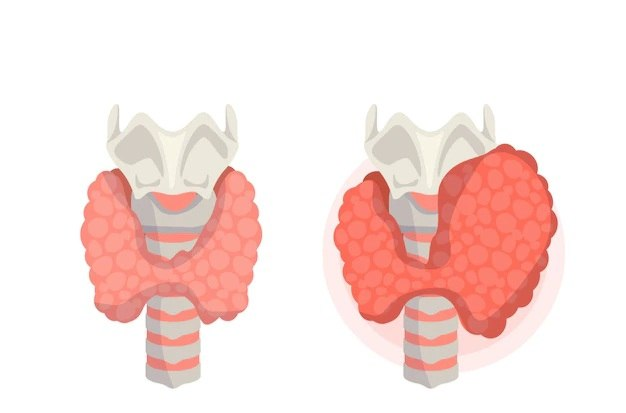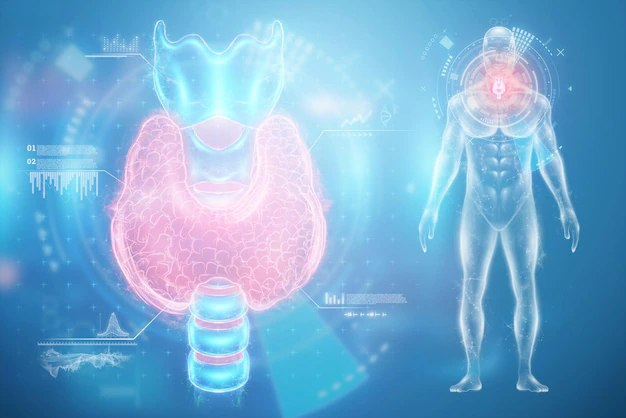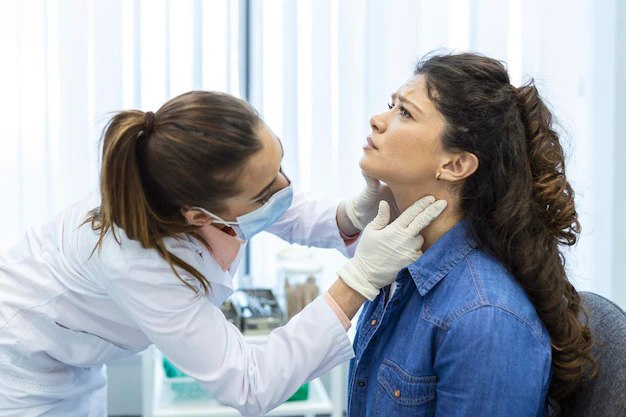
 Instagram
Instagram
Related products
When to worry about thyroid nodules
.png?v=1673003763234)

Related products

When to worry about thyroid nodules
Thyroid nodules can be a worrying sign for anyone, but it’s essential to understand when to worry about them. Thyroid nodules are generally considered to be harmless. Still, there are certain occasions when it is important to be aware of the potential risks and to seek medical advice. This article will discuss when it is necessary to worry about thyroid nodules and how to ensure that you maintain your health.
What is a Thyroid nodule?

The thyroid gland is a butterfly-shaped gland located in the neck that produces hormones that help regulate metabolism, heart rate, and body temperature. A thyroid nodule is an abnormal growth of cells that can form in the thyroid gland. A nodule can be solid or filled with fluid and range in size from a few millimetres to several centimetres.
While the majority of thyroid nodules are benign or non-cancerous, others can be malignant or cancerous. It is essential to be aware of any nodules that develop on the thyroid or if existing nodules grow or change in size to seek medical help.
Thyroid Nodules: Causes and Risk Factors

Various factors can cause thyroid nodules, ranging from genetics to environmental factors. Common causes of thyroid nodules include:
-
Inherited disorder or family history of thyroid disease;
-
Iodine deficiency;
-
Exposure to radiation;
-
Thyroid disease;
-
Previous thyroid surgery; and certain medications.
Women are more likely to develop thyroid nodules than men, and people over 60 are at a higher risk. In some cases, thyroid nodules can be caused by an underlying cancerous growth. Therefore, it is vital to have nodules checked out by a doctor to rule out any severe medical conditions.
Generally, it is best to speak to your doctor if you have any of the above risk factors or experience them.
When to Worry About Thyroid Nodules

Thyroid nodules are surprisingly common and are seen in up to 40% of the population. In most cases, these nodules are benign. Still, keeping an eye on them is important as they can indicate a more serious condition. It is best to consult with your doctor if:
-
The nodule is rapidly growing,
-
Multiple nodules present
-
The nodule has a hard texture
-
The nodule became painful or tender in the area
-
A nodule is causing hoarseness, difficulty swallowing, or difficulty breathing
Additionally, if you experience any of the following changes in your body, it is essential to visit your doctor:
-
Sudden unexplained weight loss or gain,
-
Fatigue,
-
Constipation or Diarrhea
-
Palpitations
-
Sleep problems
-
Anxiety, Depression, or
-
Changes in your menstrual cycle.
Generally, if the nodules are small and produce no symptoms, they can be monitored to ensure they remain benign. If you are ever concerned or unsure about your thyroid nodules, it is best to consult your doctor to ensure you receive the best care.
Can thyroid Nodules be cancerous?

Lumps on the thyroid are common, but thyroid cancer is rare. Only about 5 of every 100 lumps on the thyroid are cancer (5%). It is important to remember that most of these growths are benign and do not pose severe health concerns. However, it is essential to be aware of any potential warning signs. These signs are:
-
Nodules larger than 1.5 centimetres, or if you have multiple nodules,
-
If you have a family history of thyroid cancer, or
-
If the nodule is rapidly growing.
-
Other warning signs include difficulty swallowing or breathing and being male under age 40.
If you experience these symptoms, you should see your doctor immediately, as they may indicate thyroid cancer. Your doctor will likely order some tests to determine the cause of your nodules and whether or not they are cancerous.
It is important to remember that thyroid cancer is highly treatable when detected early. So it is vital to seek medical advice if you have any of the above symptoms.
How Are Thyroid Nodules Evaluated?

Knowing what to look for and when to worry is crucial if you have been diagnosed with a thyroid nodule. Symptoms such as a lump in the neck, difficulty breathing, hoarseness, and rapid heart rates should be evaluated by a doctor immediately.
Thyroid Tests
A thyroid function test is usually the first step in identifying if a thyroid nodule is a cause for concern. This blood test measures thyroid hormone levels, including the thyroid-stimulating hormone levels produced by the gland. It can help determine if the nodule is functioning abnormally. If the test results are abnormal, which are decreased in the case of overactive thyroid (hyperthyroidism) and increased in hypothyroidism, your doctor may recommend an ultrasound or fine-needle aspiration biopsy.
A thyroid ultrasound helps identify the size, number, and location of the nodule(s). Further testing, such as a biopsy or a radioactive iodine uptake scan, may be recommended to determine if the nodule is cancerous or causing any other health issues.
Depending on the results of these tests, additional tests may be recommended, or a treatment plan may be developed. Working with your doctor to determine the best course of action for your situation is essential.
Thyroid Nodules but with normal test results
If you have had a thyroid ultrasound that shows nodules, but your blood tests come back standard, it is vital to keep an eye on them. Speak to your doctor about your options, such as repeating the ultrasound in a few months or doing needle aspirations.
Suppose you have any other signs or symptoms that could indicate thyroid issues, such as fatigue, weight changes, or changes in your heart rate. In that case, it is crucial to speak to your doctor. Even if your blood tests come back standard, it is a good idea to have a follow-up appointment to discuss any changes you may have noticed.
Treatment of Thyroid Nodules
Thyroid nodules are generally harmless and are not always cause for worry. Still, it is important to be aware of them and proactive about prevention. For those at risk, it is important to get regular check-ups and screenings, especially if there is a family history of thyroid disease.
Furthermore, it is essential to pay attention if you notice any changes in the neck area, such as swelling or lumpy areas, and contact a healthcare professional. Eating a nutritious diet, exercising regularly, and reducing stress are essential to keep your thyroid hormones balanced.
If your doctor finds that the nodules are cancerous, you will need treatment to remove them and prevent further growth. Treatment of a nodule can include surgery, radiation therapy, or hormone therapy.
In conclusion, most thyroid nodules are benign. Thyroid nodules can also indicate thyroid cancer, so it is important to seek medical care if you experience any unusual swelling with symptoms. Causes of thyroid nodules include thyroid cysts and thyroid disease.
Here are some available thyroid function blood tests here.


















 Rated Excellent by 26,523+ Reviews
Rated Excellent by 26,523+ Reviews